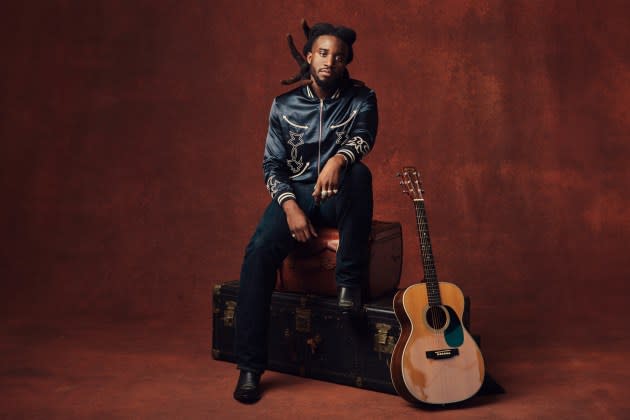Shaboozey is Honoring Country Tradition and Moving It Forward

A crowded bar, copious drinking, a strummed guitar and a chorus that will make even abstainers want to shout along: Shaboozey’s “A Bar Song (Tipsy)” has it all, which explains why it’s vying for summer-mainstay status with Kendrick Lamar’s “Not Like Us,” Sabrina Carpenter’s “Espresso” and Post Malone and Morgan Wallen’s “I Had Some Help,” It’s easy to categorize those songs, but what exactly is “A Bar Song (Tipsy)”? Hip hop with country flavor? Country with rap trimmings? Or some ingenious melding of the two that portends a new genre?
“A Bar Song (Tipsy)” isn’t the Virginia-born, Nigerian American first rodeo. His 2022 debut, Cowboys Live Forever, Outlaws Never Die, dipped its toe in country waters, leaving behind his sulking first single, “Jeff Gordon.” But Cowboys still felt very much steeped in hip hop. On its follow-up, Where I’ve Been, Isn’t Where I’m Going, he comes across like someone raised on country who also appreciates hip hop. In doing so, he’s effectively changed the game. Cowboy Carter (where he made two cameos) lobbed the first volley in redefining and modernizing country, but Shaboozey’s second album is a full-on barrage of all those possibilities.
More from Rolling Stone
The Marias, Shaboozey, Kehlani, and All the Songs You Need to Know This Week
How Shaboozey Channeled Zach Bryan and Pharrell Williams to Make 'A Bar Song (Tipsy)'
Country traditions are embedded in the album at nearly every turn, and not merely when the occasional banjo or guitar twang pop up in one of its songs. Throughout the record, Shaboozey taps into time-honored Nashville imagery: freight trains, getting loaded and asking Jesus for redemption. In “Vegas,” a town that serves as a metaphor for his life, he’s “sipping on whiskey,” drinking himself to sleep and ultimately apologizing to his mom for disappointing her. Like a modern country outlaw, he’s “ducking cops in the dirty hills” in “Last of My Kind,” an outlaw ballad in slow-grind motion.
But his melding of hip hop and country is ultimately even deeper and richer, and never a novelty act. When he sings, which is often, Shaboozey reveals a weary baritone imbued with Nashville heartache. Working with producers Sean Cook and Nevin Sastry, he crafts songs that effortlessly blend the deep-bottom sonics (and occasional sense of dread) of hip hop records with the beefy choruses of post-Shania country-pop. “Let It Burn,” his advice to a woman in a toxic relationship, is a sublime example; it’s a song that will get both country and rap heads on the dance floor. And he sounds ready to headline the Ryman on “Finally Over,” where he wards up despondency by way of a pedal steel and a melody with a wide-open-spaces beauty to it.
Just as some country can overdo the mopiness, so can Shaboozey. “My Fault” finds him and duet partner Noah Cyrus in sweet-nothing pop. And when he complains about his life, he verges on modern-careerist self-parody: “All my friends have got careers/And mine just might be over/If I don’t sell my soul again/For another viral moment,” he laments at one point, about .. his biggest song?
But there’s no better example of his lofty goals than “Annabelle,” his own variation on the time-honored cheating song. Here, he’s accusing a woman of philandering and admit he’s “looking for revenge.” Its most cutting line — “Now that we speak less, you filled with regret/And you drink till I’m no longer stuck in your head” – is the country-rap version of Stevie Nicks’ chorus in “Silver Springs.” For all its gloom, though, the song is an out-right country banger. It’s a downer, but an uplifting one. If that’s not continuing the country tradition, then nothing is.
Best of Rolling Stone